Translated by John Freedman
Artist and actor Oksana Smith lived in Moscow, Russia, with her parents, until they succumbed to COVID. Following is her story of the intersections between disability — she has significant cerebral palsy — illness, death and, ultimately, freedom in a nation that refuses to fully acknowledge any of these things.
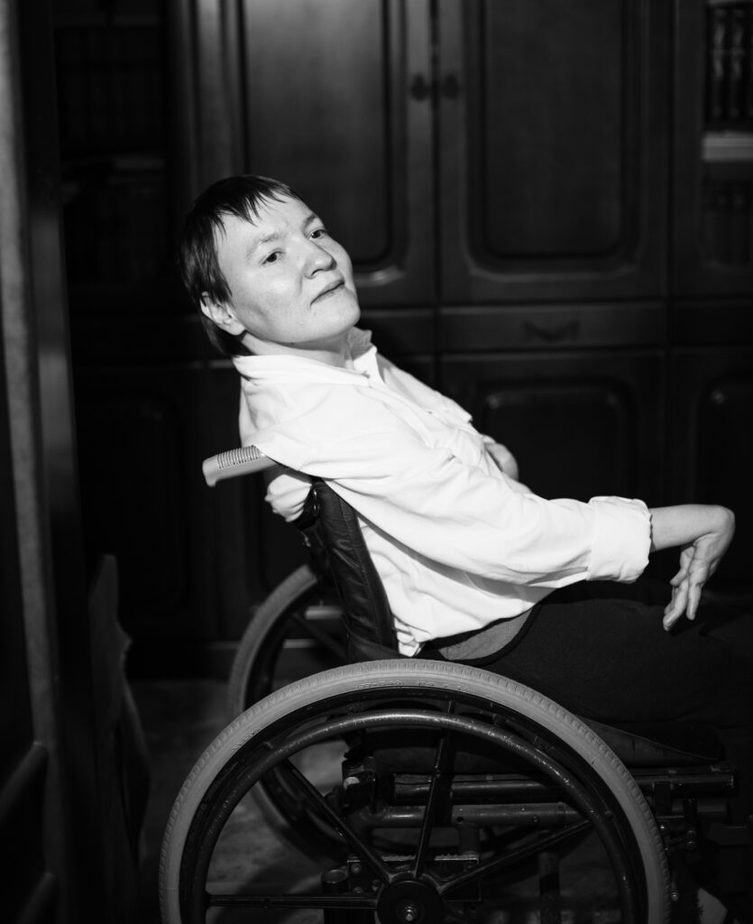
When my father fell ill, I did not understand the full consequences at first. I called for him from my room again and again. He sat in the kitchen and muttered endlessly, as though engaged in conversations with those no longer of this world. He could not get up from his chair. It was late at night, and I did not know yet that my life had collapsed. Mother woke up. She herself is seriously ill and she falls asleep all hours of the day. She measured father’s temperature — 102.
I sat in my wheelchair all night long. Mother found the strength to pull father to bed, although he had lost all sense of space and was barely conscious. She did not have enough strength left to lift me into bed.
It was already a bright morning on May 22 when the ambulance arrived. The medical personnel separated me from my wheelchair backrest and slipped the hoist holders under me so that mother could raise me up.
Mother pushed my wheelchair aside and began to settle me into bed when we heard father’s quiet footsteps. He appeared in the frame of the door, illuminated by a ray of morning sun passing through the window. As if nothing had happened at all, he hurried forward to give mother a hand. Unbutton, lift, extricate, pull, wash, and tuck me in. His smile was filled with sunshine. It was the last time I saw my father alive.
I lay in bed, and my head felt like it would explode. Through the haze of pain, I heard voices and steps. Someone walked heavily down the corridor and a loud, piercing woman’s voice — presumably directed at father — spoke as if to a 3-year-old.
Tears burst from my eyes. I wanted to call out to father, but I knew it was pointless now. My body went numb. My thoughts raced back and forth from my father to my mother, and then to my awkward physical position.
What will happen to us all now?
Pain, panic, despair.
On Being Disabled in Russia
My American editor asked me to write an article about the general situation of disabled people in Russia. I’d like to answer with a single phrase: “It sucks!” But I’m afraid that such a laconic answer would not satisfy him, and so let me hasten to provide some details.
I’ll begin at the beginning. As a Soviet representative said when asked in 1980 if the USSR would participate in the first-ever Paralympics, “There are no invalids in the USSR.” As such, I did not officially exist until my 12th birthday.
A strange child lay on the bed waiting for mom or dad to come home from work. Sometimes this child was placed in an extremely uncomfortable baby carriage, because at the end of the 1980s not a soul in Russia had ever seen a wheelchair for children.
This child was sent to a regular public school, and not to a correctional school, thanks purely to the heroic efforts of my mother. Even then I was only able to begin school when I was 10. The fact that this child had, since the age of 8, known how to type and had written novels set in Paris was of no interest to anyone.
Such is a short historical sketch of my childhood.
After the breakup of the USSR, an event over which many of my fellow countrymen still weep and moan, the situation slowly began to improve. The 1990s were difficult, but full of change.
Yes, people lived in poverty. Some lost their jobs and, rather like infants being separated from the warmth of their mothers, gave in to despair and depression. But when the wave of lies about a totally healthy and happy society began receding, the realities of life came to light. And it turned out that there are all kinds of different people, and that, among them, are people with disabilities.
It also turned out that just because a person could not walk or talk didn’t mean they couldn’t earn a salary. In the first two years of the “New Russia” I was transformed from a mumbling, unintelligible teenager into an advertising agent who supported her family. I was 15 years old. I sent out advertisements by fax. For me this was nothing short of a miracle! My parents could not believe that their helpless, hunched-over daughter earned enough with her first paycheck to buy a television.
In time, people slowly began to realize that there were individuals with disabilities around them. Pensions were provided, as was the right to spend vacations in special institutions out in the countryside.
In the middle of the 1990s, I found myself in a theater group working with the intellectually disabled. It was a rather funny situation. Someone, apparently not realizing my intelligence, invited my parents and me to a rehearsal in this theater where nondisabled actors performed alongside people with Down syndrome.
My connection with that theater emerged as one of the most important events in my life. It put me on the path toward creativity, summoning to the surface latent, long-forgotten interests in writing and drawing. Later, when this theater completed its project with the intellectually disabled actors, I joined the troupe. But that is a whole other story entirely.
The Fruitless Seed of Freedom
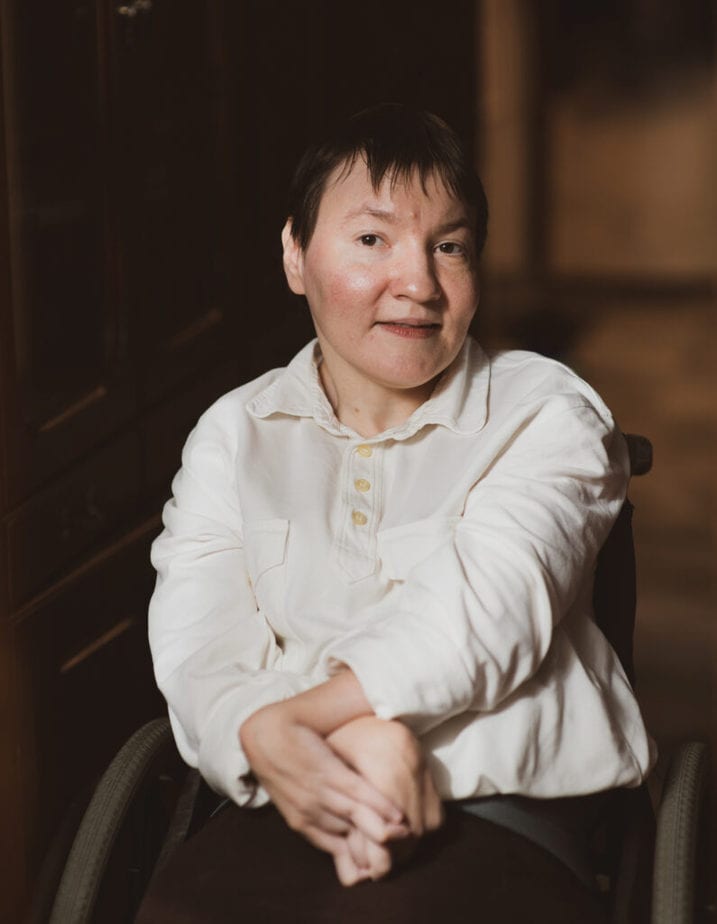
The last decade of the 20th century in Russia brought not only poverty, but also a new sense of freedom. However, no one understood that physical freedom is bound up in another, much more important kind of freedom. No one understood that in addition to delicious foreign products, beautiful clothes and a luxurious lifestyle, there were other such things as rights under the law, and a respect for otherness.
Falling on dry ground, the seed of freedom did not give fruit.
While I was a teenager, my mother spent prodigious amounts of energy advocating for disabled persons. She was an aide to a member of the Russian parliament, and her work brought about the adoption of numerous useful and necessary laws, decrees and by-laws.
But by the beginning of the new century, many yearned for a return to the Soviet Union. Slowly, but with the tenacity of the stricken Titanic, the big ship Russia began spiraling to its death, twisting round and sending up a massive spray of historical failures.
Little by little, the new undertakings began falling by the wayside. My mother’s laws were repealed one by one, and she began receiving suggestions and threats.
What kind of suggestions, you ask? Quite simple. One might be a suggestion to join the nomenklatura — a pool of people to fill government posts — glorifying the new powers-that-be. If she did so, select disabled people might be allowed to organize sewing courses, poetry clubs, or attend stuffed toy circles. But they would not be allowed to change anything of substance in the country. Or she could refuse. And then her organization would receive no funding, no benefits, nor places in which to meet.
Mother refused. She refused because she had a conscience and a clear understanding that neither I nor anyone else with disabilities would have a place in such a token system. It was beneath her human dignity to be a cheerful screen for inhuman power structures.
I participated only indirectly in these events. All my thoughts were occupied by my creative work, although I deeply supported my mother.
Time has shown that she was right.
An Ending
When I learned I had COVID, I was terrified, imagining myself lying on my stomach and wheezing through infected lungs. Nothing of the sort happened. My COVID covered me with a damp, thick blanket, dulling all my senses. Basically, it was like the common flu, only with severe headaches and the absolute loss of taste. Eating was strange. I could discern only what was salty or sweet. Sometimes, as if from afar, I might get a whiff of coffee. It was the same with the other senses. I perceived what was happening as if I were many kilometers away from my body. My father’s ghostly voice on the telephone did not seem to reach me at all. But, for all of this, I remained quite collected. I had problems to solve, for my mother no longer had the strength to take them on.
“My COVID covered me with a damp, thick blanket, dulling all my senses. Basically, it was like the common flu, only with severe headaches and the absolute loss of taste. Eating was strange. I could discern only what was salty or sweet. Sometimes, as if from afar, I might get a whiff of coffee. It was the same with the other senses. I perceived what was happening as if I were many kilometers away from my body.”
Someone — not I — shouts into a smartphone left on my pillow, “Father, father, send me Farzona’s phone number, please!” Silence. Mumbling. A short, “got it,” followed by a click.
Father never sent me our cleaning assistant’s phone number, and I had to find her on Facebook, half hanging in my hoist, half sitting in my wheelchair.
I have always been shy about my naked body, trusting it only to family members, but now I didn’t care who dressed or fed me. It didn’t matter. Survival was the thing. As long as the deliberate, eternally late Farzona came and lifted me into life.
Meanwhile, death lurked close by. No. I had no premonitions about father. I had no dreams, saw no mysterious clouds swirling in the middle of the room. Death simply came one evening with a shopping bag and sank wearily into a chair near the kitchen table. We didn’t even notice it, Farzona and I, as we chatted about trifles and looked at fashionable handbags on her Instagram. By that time, my illness had almost receded, and I thought the worst was over. My friends’ voices had brought me back to myself. Their concern for me made my heart beat properly in place. How wrong I was to think that.
On this evening we could not wake my mother. Fate apparently was preparing her for the most terrible event in her life, plunging her into either sleep or oblivion. I did not hear the phone ringing in her frozen hands. Still weak from illness, I fell to sleep, lulled by the smell of incense that seemed to reach me from afar, although Farzona had placed the burner next to me, on the windowsill.
When mother entered my room the next morning, she looked like a ghost. It seemed there was no longer a body inside her white, terry cloth robe.
“Your father is gone.”
I buried myself in my pillow and a heavy, almost bestial cry leapt from my chest.
Grief filled every cell of my body. That morning flashed before my eyes, as did his bright, smiling face.
Where now has this smile gone, where are those blue eyes?
Death transformed this light into crystal beads and wove them into an infinitely long necklace. Death loves decoration.
Farzona was late again, and my mother, overcoming her pain, put me in the scratchy net of the hoist to bathe me. I remember how I sat, bathed and clean for some unknown reason, and listened to the sobs of Farzona, who had finally arrived, out in the corridor.
“The poor, poor man!”
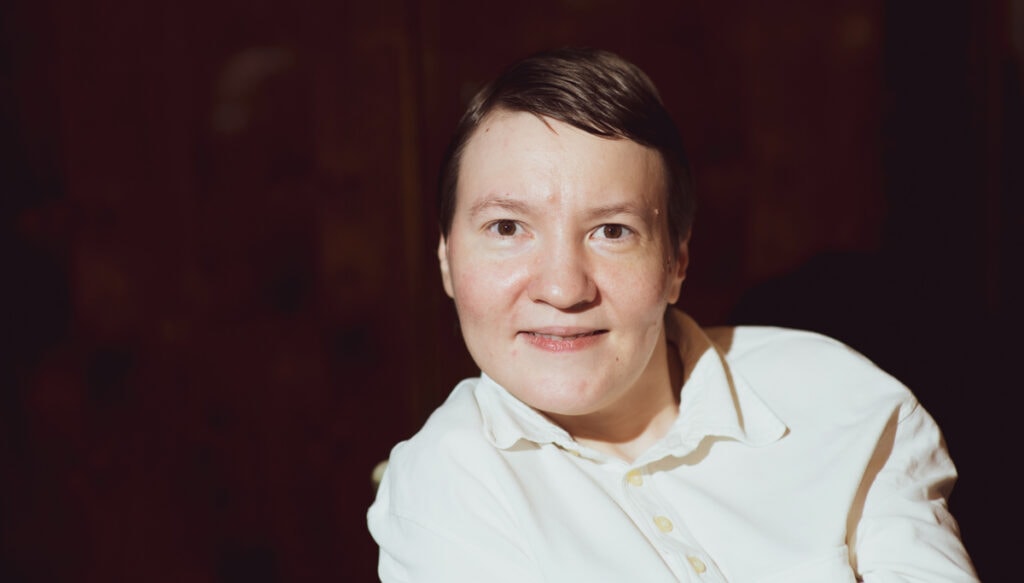
The Beauty of Eternity
In all the 42 years of my life, I had never seen a dead body. When my grandparents died, I was not taken to their funerals. As a child, I was protected from that. Now it was different. I had to choose a coffin for my father. His last earthly refuge.
My tears ended on the second day. I lived strictly in the moment. On the day of the funeral, I felt terribly sick. We descended the ramp at our entryway and the driver of a wheelchair taxi hurried up to us. For some reason, he tried to persuade me to switch into another wheelchair. Confusedly, we explained that I cannot sit in any other wheelchair. After a short back-and-forth, I was lifted on the hoist.
The sunny summer day looked gray through the cloudy glass. I stared indifferently at the children playing in the playground. A wall of grief separated me from the laughing world. And when I turned my head, I saw my mother being led forward, her arms propped up by other arms. She was holding on with the last bit of strength, my poor mother.
A lump of sickening weakness rose in my throat as the door slammed shut. We were in a hurry. As always, someone had told someone the wrong time, and someone else had forgotten to warn still some other person. As a result, the wheelchair taxi was an hour late.
We hurried as if father were waiting for us somewhere alive. And when we arrived, he would greet us and offer us tea, black bread and bacon.
“I have nightmares about not being able to get out of bed. For many nondisabled, busy people, a bed is a longed-for oasis with its soft clouds of blankets and comfy islands of pillows. It’s never been like that for me. The burning desire to do something has always been so great in me that, even when I was a young child, nobody could ever put me to bed for naps during the day.”
Finally, we arrived and were greeted by friends. Everyone nodded sadly from a distance. Solemnly we ascended a small ramp and entered the hall where a coffin already lay beside a lectern. I didn’t see father. The coffin stood high on a pedestal, and I felt sad.
Suddenly I saw someone in black approaching me. Two people picked up my wheelchair as if it were a feather and I see …
… a calm face, possessed of the beauty of eternity. I soar. I feel sick no longer. A strange, quiet joy overtakes me.
“It’s all right, kid,” a memory of father’s voice drifts to me. “This is life.”
The Soul is Greater than Any Carcass
When I was an actor in the mid-1990s, my beloved director Boris Yukhananov walked past me and composed a poem. It was long and very funny, but now I only remember the first line about the soul and the carcass — dushá and túsha in Russian. Every time my body has distressed or been a burden to me, I remember that poem and smile.
Somebody asked me recently what it’s like to be me.
What comes to mind is the phrase “immobile mobility.” My mind is mobile and free. It flies where it pleases. It topples unjust governments, and it battles evil. My body, however, is immobile. Only a few impulses pass through my brain. Right now, my hand reached to the side, traced an arc, then fell on my pillow.
The pillow cools my hand and I doze off into a momentary dream. But I jar awake and instantly remember that my father has died, I have a splitting headache, and the worst nightmare of my life is coming true.
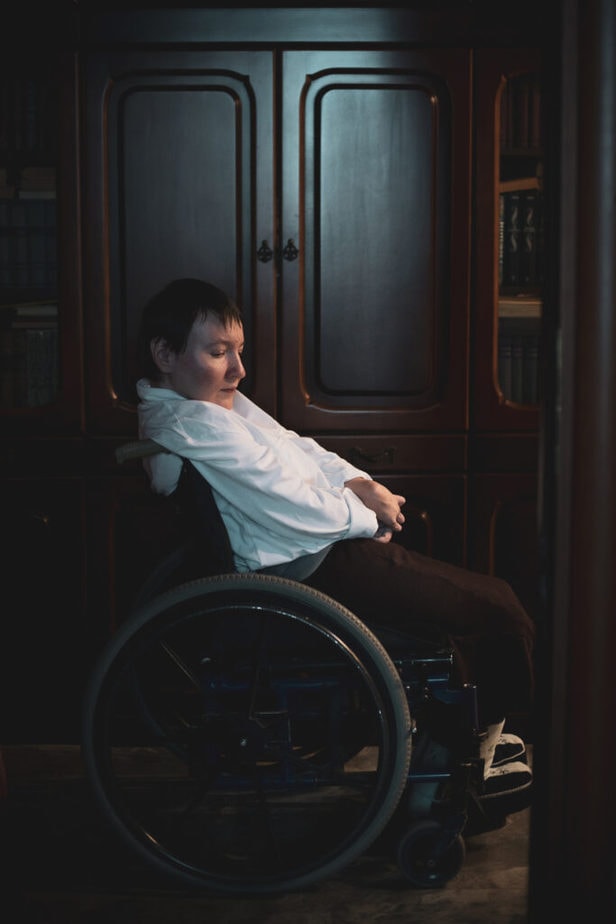
I have nightmares about not being able to get out of bed. For many nondisabled, busy people, a bed is a longed-for oasis with its soft clouds of blankets and comfy islands of pillows. It’s never been like that for me. The burning desire to do something has always been so great in me that, even when I was a young child, nobody could ever put me to bed for naps during the day.
I hate being trapped in a bed. I look around at things and begin to think they are as rational and full of spirit as me. I wonder, what political beliefs does this imposing wardrobe hold? And who is this staid lamp in love with now?
Am I delirious? The minutes slog by so slowly I wonder if someone dunked them in honey. Hope thrashes around my brain as a fly might against a window.
Don’t lose heart! Someone will come soon and sit me up, and my life will take its course anew. I lose myself in thought again. They are somber thoughts.
In Russia, unfortunately, people with disabilities are made even more helpless than we really are. Then the same people who do that to us complain about our helplessness and how we have no prospects for the future.
Now, who can have prospects when the state only cares for its people for show? I have observed that the more oppressive a state is, the more it persecutes all the possible minorities, and the more hostile it is to those with disabilities.
However, do what you may, time surges forward, constantly posing new questions that we must answer.
What is a human body? And the soul? Perhaps our soul is our individuality, the essence that makes us unique. However, I’ll think about that later, for I just heard the door squeak, and mother has entered the room. In a few minutes I, the power of love, and the hoist will lift me up.
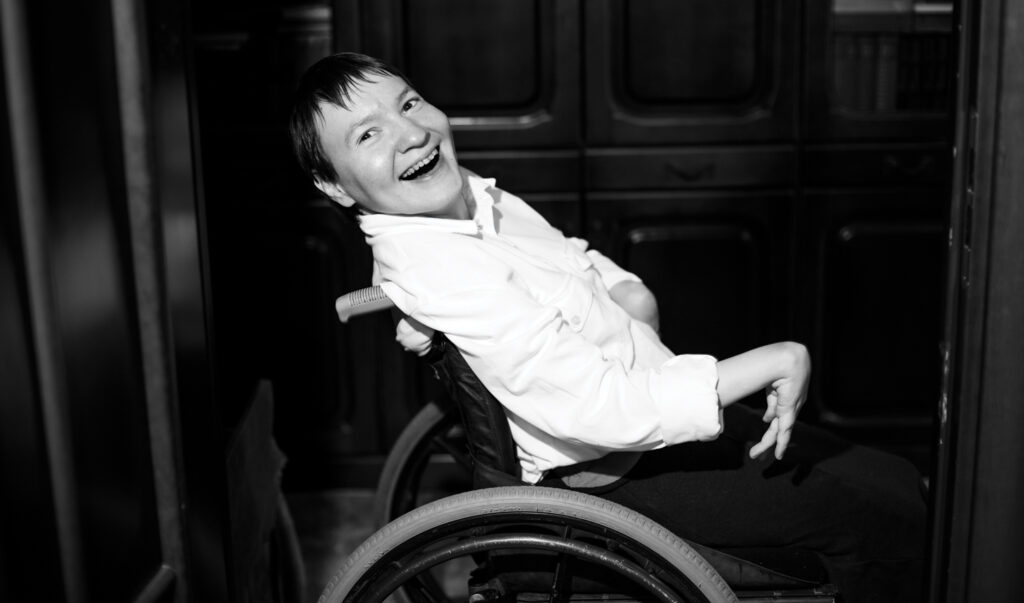
Life and Freedom
Now I am on my own. My mother, unable to bear the heavy loss of my father, followed him into death. But what about me? I embarked on an unexpected, unknown and completely new life.
I was not taught how to take care of a house. Unfortunately, I was indoctrinated with fear that, were I to remain alone, I would not survive more than a few months because the iron hand of the state would seize me immediately and throw me into some reeking Soviet-style asylum. There, no doubt, I would be killed because I have great difficulties speaking.
Did I believe that fear? Yes. In part. But as I matured, down deep inside of me, I don’t know where from, an understanding grew and strengthened that I was not all that helpless.
Now, I have learned to tighten my inner strengths into a fist. I have also learned to listen to no one. I usually smile at all the advice I receive, but I do whatever I think needs doing.
This isn’t stubbornness. More likely it is tenacity.
I’m fortunate, for now, for the people who surround me. I’m fortunate that circumstances allow me to remain in our home after my mother’s death. I believe the time will come when my home, recovered from the grief that shook it, will shine brightly.
Oh, my poor home! For over a year it was as sick as its inhabitants. It was sick with never-ending disorder and disrepair, its walls swollen with dust. My grandmother’s favorite vase gazed with displeasure at the broken faucet, and it, in turn, stared stupidly at a long-forgotten stuffed toy.
The house and all that was in it kept watch as my poor mother, descending into delirium, raved and tossed about on a mattress laid on an endless number of boxes.
I sat next to her, and it seemed that the story of my father’s illness one and a half months ago repeated itself. Again unconsciousness, again delirium and again a bright ray of sunlight. Only this time it was not the morning sun that blessed and soothed us, but a furious, hot ray of sun that parched every living thing and obliterated coolness. It shone on my mother’s face, making her rave and toss about even more.
But this time, something had changed.
I was no longer alone.
In some incredible way, these terrible events brought me closer both to friends and to people I had not known before. While my father was alive, I lived in a bubble that was now shattered. My soul was exposed to all winds. These winds carried it away from an illusory, half-childish existence into the real world.
Support New MobilityWait! Before you wander off to other parts of the internet, please consider supporting New Mobility. For more than three decades, New Mobility has published groundbreaking content for active wheelchair users. We share practical advice from wheelchair users across the country, review life-changing technology and demand equity in healthcare, travel and all facets of life. But none of this is cheap, easy or profitable. Your support helps us give wheelchair users the resources to build a fulfilling life. |


What a brilliant mind there is inside this trapped body of life.
If there was/is anything I could do to try and help this lovely woman cope better while in this life I would try and do it. I can only thank that I live here in England, where there are Law’s to protect all people with disabilities.
Dear Michael, I am very glad that you like my article. It’s very sweet and kind of you to suggest some help for me. Now I am fine. I have my house renovated almost and also I have good people around. I am earning money and paying for my care. It is not easy but I have a good mood.
How splendidly you have written about a terrible situation. Your tenacity and resourcefulness carrying you through.
I am a spinal cord injured quadriplegic and you have described exactly the way I feel when I am in bed, trapped and completely helpless, even to turn or scratch an itch. My total care by my long-suffering partner of 29 years who came to me when I first needed help and stayed. So far, we have eluded Covid-19. But I must hire others so if she should, by chance like your parents, suddenly disappear, I would be lost and probably would die very soon without help to even get me water to drink. I have no friends or even neighbors nearby to help me. My family, some who have had Covid-19, are over a thousand miles away and cannot come to me to my aid. Fortunately, we do have much assistance for the disabled in this great country, the United States of America. But there is no real safety net for those of us like you and I, totally dependent on our own resources for help so that we can be sustained in our own homes.
Ronald W. Hull, EdD
Quadriplegic C4-C6 49 years from surgical failure
Dear Ronald, thanks a lot for your letter. I am actually very moved by it. You will not die if you have a spirit. I thought I was going to die but suddenly I felt very strong. If I were religious I’d say that God saved me. Well, whatever was it, it was powerful. I said to myself, – No, it isn’t the end. Not yet.
I am 43 years old and I am going to make it.
Dear Ronald, what state do you live in?
Your story is very well-written. You have great inner strength to face and overcome these obstacles, challenges and major losses. Thanks for sharing your inspiring story!
Thank you, it wasn’t easy. But I’m glad I did it.
Thank you for being so open in sharing your story and experience. I appreciate the rawness and vulnerability with which you write. I am really moved by the line, “This isn’t stubbornness. More likely it is tenacity.” I would agree! You also exhibits a great deal of resiliency! Best wishes as you continue to speak your truth and navigate life following the loss of your parents.